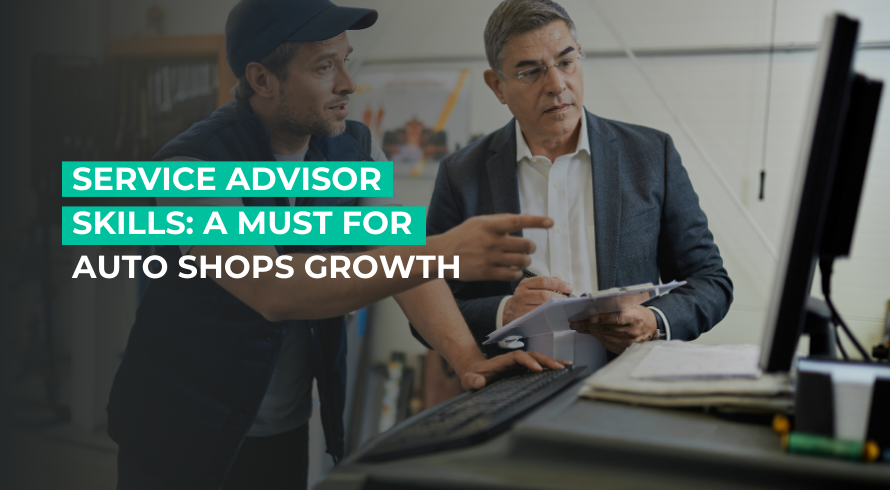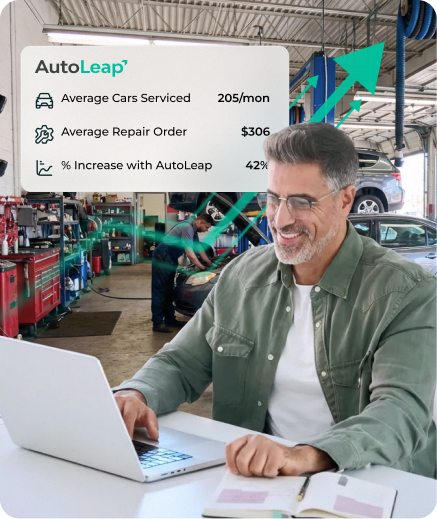A successful service advisor is the heart of any auto repair shop. They juggle with technical expertise, customer relations, and operational efficiency. But what exactly are the essential skills a service advisor needs to thrive in the auto industry?
Core skills for service advisors in auto repair shops
Being a service advisor isn’t just about booking appointments or writing repair orders. It requires a unique blend of technical, communication, and business skills. So, they can keep both customers and technicians happy. Let’s break down the core service advisor skills:
1. Mechanical and engineering expertise
Service advisors must understand the technical aspects of vehicles. They don’t need to be mechanics. But they need enough knowledge to explain repairs to customers clearly and translate what technicians are saying.
Example: If a customer comes in worried about a strange noise. A good service advisor should know how to describe potential issues. Like a faulty alternator or worn-out brakes in simple terms, providing reassurance.
2. Excellent people skills
Communication is key. Service advisors are the bridge between the customer and the technician. They need to explain complex repairs in an easy-to-understand manner. A friendly attitude and active listening go a long way in making customers feel heard and cared for.
Example: Imagine a frustrated customer coming in after multiple failed attempts to fix their car. A skilled service advisor will listen, empathize, and ensure they leave with a plan to resolve the issue.
3. Strong comprehension skills
Service advisors need to grasp the details of each repair, estimate, and customer request. Whether it’s to understand a customer’s concerns or absorb technical updates from mechanics. Comprehension skills promote accuracy and efficiency.
4. Technical knowledge
Service advisors should be familiar with automotive systems, parts, and diagnostics. This helps in creating accurate estimates and advising customers on preventative maintenance.
5. Mathematical skills
Creating estimates involves calculating parts, labor, and taxes. Basic math skills ensure that the customer gets accurate pricing, which also impacts the shop’s profitability.
6. Organizational abilities
They handle the paperwork and manage appointments. They also coordinate between the service team and customers. Hence, service advisors need to stay organized. Strong organizational skills reduce wait times and avoid scheduling conflicts. It also helps maintain smooth operations.
7. Sales and marketing acumen
Service advisors are often responsible for upselling services and suggesting preventive maintenance. Having a knack for sales while maintaining a customer-first attitude helps boost revenue without feeling too pushy.
Example: A customer might come in for an oil change. But a sharp service advisor could notice signs that the brake pads are wearing thin. And offer a solution before it becomes a bigger, costlier problem.
8. Adaptability and problem-solving
Auto shops are fast-paced environments where unexpected issues arise. Whether it’s a delay in parts delivery or a dissatisfied customer, service advisors need to think on their feet and offer solutions quickly.
Developing and enhancing service advisor skills
Becoming a top-tier service advisor isn’t just about having the right skills—it’s about continuous development and staying ahead of industry trends. Here’s how service advisors can grow in their roles:
1. Join training programs
Many training programs are designed to help service advisors improve their customer service skills, understand new automotive technologies, and streamline their communication with technicians.
2. Formal education and certifications
While a degree isn’t always necessary, courses in automotive technology, customer service, or business management can help service advisors enhance their expertise. Industry certifications can also add credibility and boost career growth.
3. On-the-job experience
Experience is one of the best teachers. Service advisors improve by learning from real-world situations, whether it’s handling difficult customers or finding solutions to tricky repair problems.
4. Mentorship and coaching
Having a mentor can accelerate learning. Experienced service advisors can offer valuable insights, share best practices, and guide newer advisors through challenging situations.
5. Self-led learning
From reading automotive magazines to attending industry webinars, service advisors can proactively seek out information to stay informed about the latest trends and best practices in the automotive industry.
The influence of hiring a skilled automotive service advisor on your shop
Hiring a service advisor with the right skills can significantly impact your business. Here’s how:
1. Customer retention and loyalty
Customers are more likely to return to a shop where they feel valued and understood. A skilled service advisor not only resolves issues but builds relationships that encourage repeat business. When customers trust their service advisor, they’re more likely to remain loyal to the shop.
2. Operational efficiency
An efficient service advisor ensures that jobs are completed on time, technicians get the right information, and customers aren’t left waiting. This streamlined workflow leads to higher productivity and profitability.
3. Improved customer communication
Service advisors serve as the bridge between customers and technicians, translating complex technical jargon into simple, understandable language. A good advisor enhances customer satisfaction by keeping customers informed about repair progress, costs, and timelines, which builds transparency and trust.
4. Stronger team morale and productivity
Service advisors play a crucial role in creating a positive, productive work environment. By effectively managing the flow of work orders and coordinating between technicians and customers, they reduce frustration, improve job satisfaction, and ultimately help boost team morale.
5. Reduced comebacks and mistakes
With strong organizational skills and attention to detail, a skilled service advisor can ensure accurate diagnoses and that the correct repairs are completed the first time. This minimizes costly comebacks, enhances the shop’s reputation, and improves overall customer satisfaction.
Closing thoughts
A successful service advisor isn’t just a middleman—they’re a key player in ensuring customer satisfaction, smooth shop operations, and business profitability. With the right mix of technical know-how, communication skills, and adaptability, service advisors are invaluable to any auto repair shop.
FAQs
What is the primary role of a Service Advisor?
The main role of a service advisor is to act as a bridge between the customer and the repair team. They provide repair estimates, explain the work needed, and ensure customer satisfaction.
What is a hard skill for a Service Advisor?
A hard skill for a service advisor is technical automotive knowledge. It’s essential for explaining repairs and creating accurate estimates.
What soft skills are essential for a Service Advisor?
Strong communication, empathy, and problem-solving skills are crucial. A service advisor must listen to customers, explain issues clearly, and provide a friendly, reassuring experience to build trust and loyalty.
How does a Service Advisor contribute to the shop's profitability?
By identifying additional service opportunities, upselling maintenance, and ensuring efficient workflows, service advisors help increase revenue and minimize operational delays that could impact profitability.|
What qualifications are typically required to become a Service Advisor?
Many shops look for candidates with a background in customer service or automotive repair, and some prefer certifications like ASE (Automotive Service Excellence). However, a combination of technical knowledge and strong interpersonal skills is key to success in this role.










